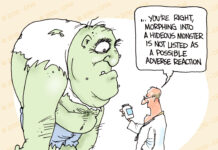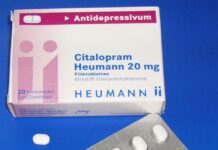On Pharma, Corruption, and Psychiatric Drugs
"My studies in this area lead me to a very uncomfortable conclusion: Our citizens would be far better off if we removed all the psychotropic drugs from the market, as doctors are unable to handle them. It is inescapable that their availability creates more harm than good."
- Peter Gøtzsche, MD; Co-founder of the Cochrane Collaboration
Polypharmacy/Bipolar illness
A. Bipolar Illness Before the Psychopharmacology Era
Prior to 1955, bipolar illness was a rare disorder. There were only 12,750 people hospitalized with that disorder...
Clinical Trials Underreport Harms of Antidepressant Medications
A group of researchers recently found serious bias in the reporting of harm due to adverse events in antidepressant medication clinical trials. They report...
Use of Antidepressants Linked to Diabetes
Selective serotonin reuptake inhibitors (such as Prozac and Zoloft) are the most commonly prescribed medication for depression. SSRIs have long been associated with an...
SSRIs Cause Epilepsy in Rats
Researchers from Australia find that chronic treatment with SSRIs significantly increases the rate of epileptogenesis in rats. Although SSRIs are commonly prescribed to people...
Michael Samuel Bloom
by Chaya Grossberg
July 25, 2012
He also told me the shrinks were changing around his drugs and adding more. They added an antidepressant or two to the Lithium and increased doses and eventually he seemed to have very little life left in him. Our phone calls became trying for he was so down, practically dead sounding a lot of the time, and I felt unable to do anything or say anything to make a difference. To even try felt futile and I wondered if talking to me at all was becoming the burden of yet another person he couldn't connect with.
In the early years, he liked to think of us as being in the same boat, both mentally ill, since I'd also had a meltdown and I also am extremely sensitive and go through extreme states. But as the years went by, especially towards the end, I seemed to be in the ever growing “other” camp in his eyes, which meant I was yet another person who didn't get what it was like to be him. And at that point I can confirm I did not, and perhaps did not want to.
The Good, the Bad, and the Ugly: An Infographic on Bipolar Drugs
Bipolar drug therapy is a balancing act of benefits vs. harms. Odds of attributable benefit cluster in a 15-25% band, so 75%-85% don’t see substantial benefit. Stated differently, if five people take a bipolar drug, only one is likely to see substantial improvement due to it, but all five will have side effects.
Part II: Michelle Starts Prozac and Sees the Devil
By 2011, anyone who read the scientific literature would have known that children cannot tolerate SSRIs and should not be given them. Neither Conrad nor Michelle seemed to have been warned about the common adverse effects (such as nightmares and compulsive suicidality) of the SSRI antidepressants they were on.
Psychotropic Medications Serve as Powerful Tools for U.S. Military, Imperialism
Ethnographic research sheds light on extensive psychopharmaceutical use by soldiers in post 9/11 U.S. wars.
Daughter of a Psychiatrist
Here I was, 15 years old and already in a long-term treatment facility. I was, on paper: crazy! This entire time, all the adults in my life had been speaking for me. I never felt like I was any of the things they said, but I went along with it. What else could I have done? Every time I rebelled, it only confirmed to my mother what she thought of me.
Researching the Link Between SSRIs and Violence
In 2010, my 25-year old son was prescribed Prozac for depression. After a psychiatrist doubled his dose, my son became acutely psychotic and had to be admitted to the hospital. Over the next twelve months, during which time he was treated with antidepressants and neuroleptics, my son had five further psychotic experiences. I thought it might be that my son was having difficulty metabolising the drugs.
101 Uses for a Dead Journal
There used to be a wonderful cartoon series called 101 Uses for a Dead Cat, which led me 25 years ago to give a talk at a British Association for Psychopharmacology meeting entitled 101 Uses for a Dead Psychiatrist. That was back in the days when Psychopharmacology meetings were places of debate and the British Journal of Psychiatry was guaranteed to have something of real interest in every issue.
Percentage of Americans on Antidepressants Nearly Doubles
From 1999 to 2012 the percentage of Americans on antidepressants increased from 6.8% to 13%, according to a report published this week by the...
Antidepressant Use Linked to Longer, More Frequent Psychiatric Rehospitalization
New study finds that antidepressants may negatively impact recovery after psychiatric hospitalization.
Violence Caused by Antidepressants: An Update after Munich
The media is now reporting details about the 18-year-old who shot and killed nine and wounded many others before killing himself on July 22 in Munich. My clinical and forensic experience leads to a distinction among people who murder under the influence of psychiatric drugs. Those who kill only one or two people, or close family members, often have little or no history of mental disturbance and violent tendencies. The drug itself seems like the sole cause of the violent outburst. On the other hand, most of those who commit mass violence while taking psychiatric drugs often have a long history of mental disturbance and sometimes violence. For these people, the mental health system seems to have provoked increasing violence without recognizing the danger.
Life, Unarmed
When I was born, everyone was expecting me to have arms. The doctor's mind raced; how am I going to tell this mother and the father that their son has hands but not arms? If he's missing so much in his extremities, mustn’t he also be missing a mind? My mom looked into my eyes and knew - in a way that only mothers know - that I had a mind, and spirit.
Interview: Researchers Deconstruct Ghostwritten Industry Trial for Antidepressant
Researchers, Jon Jureidini, Jay Amsterdam and Leemon McHenry, have taken a closer look at the data from a randomized control trial of citalopram (Celexa) that was ghostwritten and then used by the manufacturers to support claims of the drug’s efficacy and safety in the treatment of child and adolescent depression. To get the background on this story, we connected with Dr. Leemon McHenry, an investigator in this study and a lecturer in philosophy at California State University, Northridge.
Over 1,000 Antidepressant Users Describe how Their Personal Life has Been Affected
Survey examines adverse personal and interpersonal effects of antidepressants and the impact of polypharmacy
A Brief History of Prozac
Prozac, having failed as an antihypertensive then anti-obesity drug, was marketed as an antidepressant after it lifted the spirits of five mildly depressed volunteers...
In Honor of Fear and Pain
Our use of antidepressants has turned single-episode struggles that recovered 85% of the time within one year, never to recur, into chronic and debilitating disorders that hold patients hostage in their own arrested development. But, If you are in the hole of pain, here’s what I have to say to you. It’s what I say to my patients, and what I tell myself in times of struggle.
“A Glut of Antidepressants”
The New York Times reflects on various explanations for the skyrocketing use of antidepressants (the economy, pharmaceutical advertising, the effect of insurance), then reports...
Study of Online Antidepressant Forums Reveals Long Lasting Withdrawal Effects
Effects of discontinuing SSRIs and SNRIs reported on an online forum indicate significant and long-lasting withdrawal symptoms.
Winging it: Antidepressants and Plane Crashes
The crash last week of the Germanwings plane has shocked many. In view of the apparent mental health record of the co-pilot Andreas Lubitz, questions have been asked about the screening policies of airlines. The focus has generally been on the conditions pilots may have or the arguments they might be having with partners or other situational factors that might make them unstable. Even when the issue of the medication a pilot may be taking is raised, it is in the context of policies that permit pilots to continue on drugs like antidepressants to ensure any underlying conditions are effectively treated. But fewer treatments in medicine are effective in this sense than people might think and even when effective they come with effects that need to be balanced against the likely effects of the underlying condition.
Does Active Placebo Response Explain Antidepressant Results?
A new study investigated whether participants guessing if they have an antidepressant or placebo affects response rates.
Antidepressants/Depression
A. The Natural Course of Depression
Prior to the widespread use of antidepressants, the National Institute of Mental Health told the public that people regularly...






















